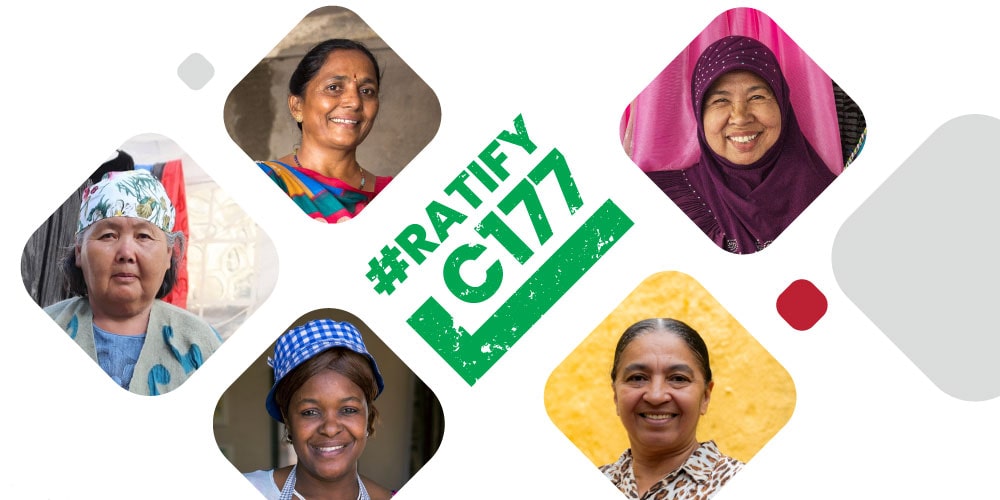October marks one year since HNI launched its groundbreaking campaign, “Home-based Workers United Towards ILO C177, Labour Rights, Social Protection, and Decent Work.” In 2023 the HNI Executive Committee emphasised the critical need for countries to ratify ILO C177, recognizing that such ratification binds member nations to take appropriate actions toward protecting homeworkers and also serves as a foundation for countries to develop policies safeguarding all home-based workers.
While acknowledging that differing national circumstances may make ratification unfeasible for all, a broader and more inclusive goal was established for the campaign. Participating countries aim to achieve labour rights, social protection, and decent work for home-based workers through one or more of the following ways:
- Ratifying ILO C177
- Developing policies for home-based workers, irrespective of ILO C177
- Improving existing policies
- Creating new guidelines or rules
The campaign is currently being developed by 14 affiliate organisations, and we are excited to share some of their updates:
Ratifying ILO C177
Nepal
In Nepal, various efforts—including meetings, workshops, and delegations by organisations working on HBWs’ visibility and rights—have prompted the Ministry of Labour, Employment, and Social Security (MoLESS) to include the ratification of ILO C177 in its Action Plan, targeting 2026. Home-based Workers Concern Society Nepal (HBWCSN) has taken the lead in actively engaging with government ministers, officials, ILO representatives, and trade union leaders to coordinate activities for ratification. They have met with the Joint Trade Union Coordination Center (JTUCC), which expressed support and proposed a joint strategy session, as well as with the General Federation of Nepalese Trade Unions (GEFONT) to focus on cooperation for HBW rights.
HBWCSN is currently conducting a gap assessment study to evaluate legal frameworks for home-based workers and provide recommendations for labour law revisions. They are also collaborating with JTUCC, which is reviewing Nepal’s Labor Law to propose amendments aimed at integrating the issues faced by HBWs. Additionally, a webinar for HBW leaders on ILO C177, its ratification, and their role in supporting the process is being planned for the end of September.
Brazil
ATEMDO has been working with an intersectoral group in Brazil that includes various workers from the informal economy. This group has been holding national meetings to discuss significant issues and amplify the visibility and voice of home-based workers. Earlier this year, they initiated a dialogue with two state deputies and one federal deputy, aiming to establish channels of communication between the government and workers while raising awareness of their struggles.
The organisation has conducted training activities for both workers and partners, emphasising the importance of ratification at solidarity economy conferences. These conferences will take place in November at the state level, with a national conference scheduled for April 2025. In addition, they will participate in a national intersectoral meeting in Brazil in November to further strengthen the dialogue on the importance of ratifying ILO C177.
Improving Existing Policy
Tanzania
Uwake’s current strategy focuses on ensuring that every member has health insurance and contributes to the pension fund. Their campaign aims to secure government recognition of the rights of home-based workers (HBWs), seeking to improve retirement savings, workplace safety, accident protection, and health insurance for members. They are disseminating this information through leaflets and advocating on various platforms.
The Uwake Organization has long prioritised retirement savings by joining the Government Employees Pension Fund (GEPF). In 2018, the government merged four pension funds—the Public Service Pension Fund (PSPF), Local Authority Pension Fund (LAPF), Government Employees Pension Fund (GEPF), and Parastatal Pension Fund (PPF)—into the Public Service Social Security Fund Act, 2018 (No. 2) (the PSSSF Act). Currently, GEPF is returning funds to Uwake members, and strategies are being developed to re-register them with the PSSSF. All Uwake members previously held GEPF cards, and discussions with PSSSF leaders, starting from the local government level, are planned.
The organisation has appointed Margreth Mushi to coordinate the community fund. Many of the organisation’s women members are elderly and unable to work. While some have health insurance, the coverage is often inadequate for their medical needs. To address this, the organisation will contribute half of the insurance costs for members, providing 100% coverage for the elderly.
Uwake is affiliated with HomeNet Tanzania. While they await the completion of their registration, they continue to receive recognition from the local government. They have received support to finalise their constitution, and their efforts are increasingly endorsed by local authorities.
Macedonia
In 2012 Macedonia ratified ILO C177. A representative from the Ministry of Labor was approached regarding the challenges faced by home-based workers and the need for legislation to regulate their rights. A meeting with the Minister to discuss these issues is planned for the end of the year.
Pakistan
Various efforts are underway across Pakistan to improve existing policies for home-based workers. All four provinces—Sindh, Balochistan, Khyber Pakhtunkhwa, and Punjab—have enacted laws to protect home-based workers, with Punjab having passed legislation most recently in 2023. Sindh was the pioneer, establishing the Home-Based Workers Act in 2018, followed by Balochistan and Khyber Pakhtunkhwa in 2021 and 2022, respectively. However, implementation continues to be a challenge, as only Sindh has passed accompanying rules and regulations. The Home-Based Women Workers Federation (HBWWF) is actively involved in supporting worker registration and advocating for faster verification processes to ensure that workers receive registration cards, which grant them formal rights. Moreover, they are engaging in advocacy with political figures, labour departments, and employers to ensure proper enforcement, particularly regarding registration and social protection.
Guidelines/Rules Irrespective of Policy
India
SEWA organised a home-based workers convention on April 23, 2024, where over 1,000 women from across India gathered to discuss their challenges. The event, part of SEWA’s campaign for ILO Convention 177, featured participation from global organisations and government officials. Following the convention, SEWA submitted a memorandum to the ILO and the Indian government, highlighting issues such as long hours, precarious working conditions, and inadequate social security. Additionally, SEWA met with the Director of ILO India to discuss the recognition of various trades and strategies for the ratification of ILO C177. SEWA also participated in a pre-budget meeting with the Indian Finance Minister, advocating for policies that benefit home-based workers, including the establishment of a climate resilience fund, the reinstatement of welfare schemes for beedi workers, and their inclusion in the Employee State Insurance Corporation.



